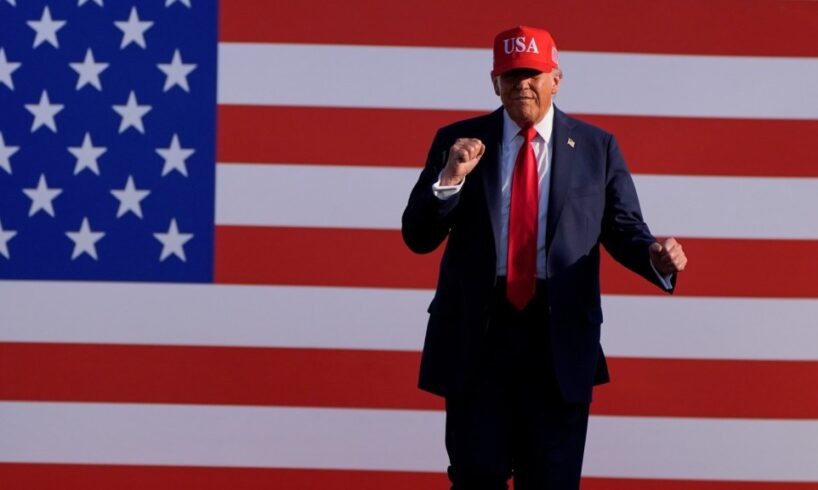
Between 1950 and 1953, folk singer Woody Guthrie and his family lived at the Beach Haven Apartments in Brooklyn, New York. Disgusted by the racial discrimination against Black families attempting to move in, he later wrote a song about his landlord:
I suppose Old Man Trump knows / Just how much racial hate he stirred up / In the bloodspot of human hearts.
Guthrie had been living in a building owned by real estate mogul Fred Trump. Twenty years later, Fred and his son Donald would be sued over allegations they had denied apartments to Black tenants. Guthrie made no known recording of the song, but “Old Man Trump” was almost certainly the first time the Trump family was referenced in song. There are now dozens.
Related Article Block Placeholder
Article ID: 1216633
On July 30 this year, the Department of Homeland Security (DHS) put out a promotional video that uses Guthrie’s most famous song, “This Land Is Your Land”, over a montage of America’s natural beauty and national monuments, interspersed with families and federal agents. “The future of our homeland is worth defending”, reads the caption.
Guthrie was an unrepentant anti-fascist. He famously applied the phrase “This Machine Kills Fascists” to his guitar — and in 1948, he wrote “Deportee“, a song mourning 28 undocumented workers from Mexico who were killed during their deportation when their plane crashed. Under the second Donald Trump presidency, DHS has supercharged the scale and brutality of deportations. We need not guess at how Guthrie would have felt about this use of his song.
It is only the latest example of the surreal, uncanny role music has played in Trump’s politics and image.
Independent. Irreverent. In your inbox
Get the headlines they don’t want you to read. Sign up to Crikey’s free newsletters for fearless reporting, sharp analysis, and a touch of chaos
By continuing, you agree to our Terms & Conditions and Privacy Policy.
You Can’t Always Get What You Want
In 1989, Keith Richards threatened Donald Trump with a knife over a deal gone bad between Trump and The Rolling Stones. Starting with his first presidential campaign, Trump has been constantly playing “You Can’t Always Get What You Want” at his rallies — where he would generally tell his supporters just the opposite. The Stones have been trying to stop him ever since; for years, he simply ignored them.
Other artists who have demanded — sometimes via legal proceedings — that Trump stop using their music include REM, Neil Young, Beyoncé, the estate of Isaac Hayes, Jack White, Celine Dion and Adele.
One artist who had no problem with Trump’s endorsement was Lee Greenwood. Greenwood’s profoundly patriotic “God Bless The USA” was initially released in 1984 and was used by then US president Ronald Reagan during that year’s National Republican Convention. Greenwood re-recorded the song during the 1990 Gulf War, and reissued the song in the aftermath of 9/11. The song was covered by Beyoncé in 2008, with her version reissued after the death of Osama bin Laden.
In 2024, Trump endorsed the God Bless the USA Bible, a version of the holy text that features Greenwood’s lyrics. It also features the American Constitution, though it excises constitutional amendments 11 through 27 — meaning the changes that say, abolished slavery, or set term limits for presidents, are not included. A copy of the bible, printed in China, costs US$59.99.
Related Article Block Placeholder
Article ID: 1216206
Is That All There Is?
In October 2024, in the key battleground state of Pennsylvania, Trump held a rally that was meant to conclude with a Q&A session with the audience. Instead, as some attendees passed out from the heat, he declared: “Let’s make this a musical fest.”
“Let’s not do any more questions. Let’s just listen to music,” he told the crowd. “Who the hell wants to hear questions, right?” For the next 40-odd minutes, he stood wordless on stage, swaying to smooth classics like “Hallelujah”, “Nothing Compares 2 U” and “An American Trilogy”.
“I had a Town Hall in Pennsylvania last night. It was amazing! The Q and A was almost finished when people began fainting from the excitement and heat,” Trump wrote on Truth Social after. “We started playing music while we waited, and just kept it going. So different, but it ended up being a GREAT EVENING!”
In January 2025, the night before Trump’s second inauguration, he held a victory rally where he was joined on stage by camp icons and Theseus’ ship in band form, Village People. Sky News Australia reported that Trump danced “spectacularly” during the band’s performance of “YMCA”.
“I don’t think you can separate Trump and his base from nostalgia,” Dr A. Jamie Saris, an associate professor in the Department of Anthropology at Maynooth University, told the BBC in a piece about why a hard-right figure like Trump loves the gay anthem so much.
“They want a do-over. That is, they want to relive certain moments that they have in their brains as when America was great; they just don’t want to deal with the contradictions. Disco was problematic for a lot of kids at the time, but now the same people who used to be uncomfortable with it are saying, ‘The 1970s were great! My back didn’t hurt!’”
Saris also noted the camp fetishising of traditional masculinity that the Village People engaged in has returned in the MAGA movement, stripped of irony: “You see these office workers at Trump’s rallies dressed up as war veterans and Navy Seals and blue-collar workers.”
Related Article Block Placeholder
Article ID: 1215501
After their performance, the leather daddy biker character approached Trump and saluted, and the president-elect saluted back.
On June 14, Trump held a 250th anniversary parade for the US military, which happened to coincide with his 79th birthday. He had promised that any protests would be met with “very great force”.
During the parade, Creedence Clearwater Revival’s blistering “Fortunate Son” — a Vietnam-era protest song written about how the children of privilege are able to dodge military service — was played.
The US president has long said that Peggy Lee’s woozy, late-’60s ode to anhedonia, “Is that all there is?” is one of his favourite songs.
“It’s a great song because I’ve had these tremendous successes, and then I’m off to the next one. Because, it’s like, ‘Oh, is that all there is?’” he said in 2014.
In the first verse, Peggy’s narrator recalls watching her house burn down as a child. Watching “the whole world go up in flames”, she asks, “Is that all there is to a fire?”
What’s your favourite (or most absurd) Trump music moment?
We want to hear from you. Write to us at letters@crikey.com.au to be published in Crikey. Please include your full name. We reserve the right to edit for length and clarity.





